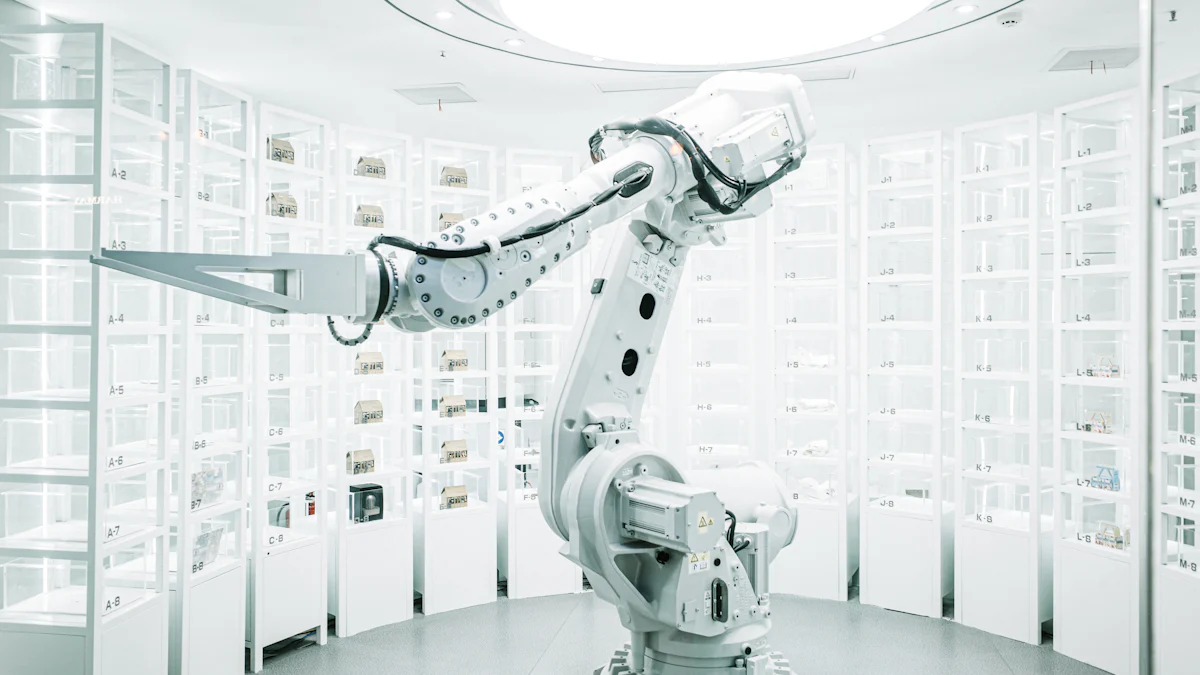AI-Powered Market Analysis and Predictions: How GenAI Fits In

Artificial Intelligence (AI) revolutionizes market analysis by providing deeper insights and enhancing decision-making processes. Businesses increasingly rely on AI to analyze data and conduct market research, with 45% of marketers using it for data analysis and 40% for market research. Predictive AI models enable financial institutions to forecast market trends and stock prices, offering a competitive edge. Generative AI (GenAI) emerges as a transformative tool, generating innovative ideas and solutions. By integrating AI-Powered Market Analysis, companies can uncover hidden opportunities and mitigate risks, ensuring strategic success in a rapidly evolving business landscape.
Understanding AI-Powered Market Analysis

AI-Powered Market Analysis has become a cornerstone in modern business strategies. By leveraging advanced technologies, companies can gain a competitive edge through enhanced data interpretation and strategic insights.
Types of AI Used in Market Analysis
Generative AI
Generative AI plays a pivotal role in market analysis by creating innovative solutions and ideas. It assists businesses in exploring new markets and identifying promising opportunities. This type of AI generates content and models that can simulate various market scenarios, providing a fresh perspective on potential business strategies.
Predictive AI
Predictive AI excels in forecasting future trends by analyzing historical data. It identifies patterns and predicts outcomes, enabling businesses to anticipate market shifts. Companies use predictive AI to project sales, estimate demand, and personalize customer experiences. This capability enhances the precision of business forecasting, making it an invaluable tool for strategic planning.
Machine Learning
Machine Learning underpins many AI applications in market analysis. It processes vast datasets to uncover hidden patterns and insights. By continuously learning from new data, machine learning models improve over time, offering more accurate predictions and analyses. This adaptability makes machine learning essential for real-time market analysis and decision-making.
How AI Transforms Market Analysis
Data Processing and Analysis
AI-Powered Market Analysis revolutionizes data processing by handling large volumes of information efficiently. AI algorithms sift through complex datasets to extract meaningful insights, allowing businesses to make informed decisions quickly. This capability reduces the time and effort required for traditional data analysis, streamlining workflows and enhancing productivity.
Real-time Insights
Real-time insights are crucial in today's fast-paced business environment. AI technologies provide up-to-the-minute data analysis, enabling companies to respond swiftly to market changes. This immediacy allows businesses to capitalize on emerging opportunities and mitigate risks effectively, ensuring they remain agile and competitive.
Automation of Repetitive Tasks
Automation is a significant advantage of AI-Powered Market Analysis. AI systems automate routine tasks, freeing up human resources for more strategic activities. By reducing manual intervention, businesses can focus on innovation and growth. Automation also minimizes errors, ensuring consistent and reliable data analysis.
Deep Dive into Generative AI
Generative AI has emerged as a transformative force in AI-Powered Market Analysis. It not only generates innovative ideas but also provides solutions that align with market predictions. This section delves into how Generative AI operates, its benefits, and the challenges it presents.
How Does Generative AI Work?
Algorithms and Models
Generative AI relies on sophisticated algorithms and models to function effectively. These algorithms process vast amounts of data to create new content or simulate scenarios. For instance, in AI-Powered Market Analysis, Generative AI can model potential market trends by analyzing historical data and current market conditions. This capability allows businesses to explore various strategic options and make informed decisions.
Data Input and Output
The effectiveness of Generative AI in market analysis hinges on the quality of data input. High-quality data ensures accurate and reliable outputs. In AI-Powered Market Analysis, businesses input data from diverse sources, such as market reports and consumer behavior studies. Generative AI then processes this data to produce insights that guide strategic planning. The output often includes innovative solutions and strategies tailored to specific market needs.
Benefits of Generative AI in Market Analysis
Enhanced Creativity and Innovation
Generative AI significantly enhances creativity and innovation in AI-Powered Market Analysis. It enables businesses to explore new markets and develop unique strategies. For example, companies can use Generative AI to create marketing campaigns that resonate with target audiences. This capability fosters a culture of innovation, allowing businesses to stay ahead of competitors.
"Generative AI can increase productivity within work or school environments by developing content quickly and solving technological problems."
Improved Decision-Making
Generative AI improves decision-making by providing comprehensive insights into market dynamics. It helps businesses identify emerging opportunities and potential risks. By leveraging AI-Powered Market Analysis, companies can make data-driven decisions that enhance their strategic positioning. This approach minimizes uncertainty and maximizes the potential for success.
Drawbacks and Challenges
Ethical Concerns
Despite its advantages, Generative AI poses ethical concerns in AI-Powered Market Analysis. The creation of content and strategies must align with ethical standards to avoid misleading consumers or manipulating markets. Businesses must ensure transparency and accountability in their use of Generative AI.
Data Privacy Issues
Data privacy remains a significant challenge in AI-Powered Market Analysis. Generative AI requires access to large datasets, which may include sensitive information. Companies must implement robust data protection measures to safeguard consumer privacy. Failure to address these issues can lead to legal repercussions and damage to brand reputation.
Generative AI plays a crucial role in AI-Powered Market Analysis by enhancing creativity, improving decision-making, and offering innovative solutions. However, businesses must navigate ethical and privacy challenges to harness its full potential effectively.
Comparative Analysis of AI Types
In the realm of AI-Powered Market Analysis, understanding the distinctions between different AI types is crucial for businesses aiming to leverage these technologies effectively. This section provides a comparative analysis of Generative AI, Predictive AI, and Machine Learning, highlighting their unique features and applications in business.
Generative AI vs. Predictive AI
Key Differences
Generative AI and Predictive AI serve distinct purposes within AI-Powered Market Analysis. Generative AI focuses on creating novel content. It can generate unique forms of media such as videos, images, audio, and text based on specific prompts. This capability allows businesses to explore creative solutions and develop innovative strategies.
On the other hand, Predictive AI excels in forecasting future events and outcomes. It analyzes historical data to identify patterns and make predictions about future trends. This predictive capability enables businesses to anticipate market shifts and make informed decisions.
Use Cases in Business
In business applications, Generative AI and Predictive AI offer different advantages. Generative AI can assist in developing marketing campaigns by creating engaging content that resonates with target audiences. It also plays a role in product design by simulating various scenarios and generating new ideas.
Conversely, Predictive AI is invaluable for financial institutions and retail businesses. It helps forecast sales, estimate demand, and personalize customer experiences. By predicting future trends, businesses can optimize inventory management and enhance customer satisfaction.
Machine Learning vs. Generative AI
Key Differences
Machine Learning and Generative AI both contribute significantly to AI-Powered Market Analysis, yet they operate differently. Machine Learning involves training algorithms to learn from data and improve over time. It processes vast datasets to uncover hidden patterns and insights, making it essential for real-time market analysis.
In contrast, Generative AI focuses on content creation and innovation. While Machine Learning enhances data interpretation, Generative AI provides creative solutions and simulates potential market scenarios.
Use Cases in Business
Machine Learning finds applications in various business sectors. It supports customer segmentation by analyzing consumer behavior and preferences. Additionally, it aids in fraud detection by identifying unusual patterns in transaction data.
Generative AI, meanwhile, is used in industries like entertainment and advertising. It creates personalized content and interactive experiences for consumers. Businesses can leverage Generative AI to develop virtual environments and immersive marketing campaigns.
Practical Applications in Business

AI-Powered Market Analysis offers transformative potential for businesses across various sectors. Companies can harness AI technologies to gain insights, predict trends, and make informed decisions. This section explores practical applications of AI in market predictions and guides businesses in selecting the most suitable AI type for their needs.
Leveraging AI for Market Predictions
Businesses increasingly rely on AI-Powered Market Analysis to forecast market trends and make strategic decisions. By analyzing vast datasets, AI provides valuable insights that drive business growth and innovation.
Case Studies
Retail Industry: A leading retail chain implemented AI-Powered Market Analysis to optimize inventory management. By predicting consumer demand, the company reduced overstock and stockouts, resulting in a 20% increase in sales.
Financial Sector: A financial institution used AI to forecast stock market trends. The predictive models identified investment opportunities, leading to a 15% increase in portfolio returns.
Healthcare: A healthcare provider employed AI to analyze patient data and predict disease outbreaks. This proactive approach improved patient outcomes and reduced healthcare costs.
Success Stories
Tech Startup: A tech startup leveraged AI-Powered Market Analysis to identify emerging market trends. By aligning product development with these insights, the company achieved rapid growth and secured a significant market share.
Manufacturing Firm: A manufacturing firm used AI to streamline production processes. The AI-driven analysis identified inefficiencies, resulting in a 30% reduction in operational costs.
Which AI Type Suits Your Business?
Selecting the right AI type is crucial for maximizing the benefits of AI-Powered Market Analysis. Businesses must consider various factors to ensure they choose the most appropriate technology for their specific needs.
Factors to Consider
Business Goals: Define clear objectives for AI implementation. Whether the focus is on innovation, efficiency, or customer engagement, aligning AI capabilities with business goals is essential.
Data Availability: Assess the quality and quantity of available data. High-quality data enhances the accuracy of AI predictions and analyses.
Industry Requirements: Consider industry-specific needs and challenges. Different sectors may require tailored AI solutions to address unique market dynamics.
Decision-Making Framework
Evaluate AI Capabilities: Analyze the strengths and limitations of Generative AI, Predictive AI, and Machine Learning. Understanding their unique features helps in making informed decisions.
Pilot Testing: Conduct pilot tests to evaluate AI performance in real-world scenarios. This approach allows businesses to assess the effectiveness of AI solutions before full-scale implementation.
Continuous Monitoring: Implement a system for ongoing evaluation of AI performance. Regular monitoring ensures that AI solutions remain aligned with business objectives and adapt to changing market conditions.
AI-Powered Market Analysis empowers businesses to make data-driven decisions and stay competitive in a dynamic market environment. By leveraging AI technologies and selecting the right AI type, companies can unlock new opportunities and drive sustainable growth.
AI significantly transforms market analysis by enhancing data interpretation and strategic decision-making. Businesses leverage AI to predict customer behaviors and market trends, ensuring they remain competitive. Predictive AI excels in forecasting future outcomes, while Generative AI fosters creativity and innovation. Future trends indicate a deeper integration of AI in business strategies, with an emphasis on personalized solutions. Companies must embrace GenAI to unlock new opportunities and drive growth. By doing so, they can navigate the complexities of the modern market landscape effectively and sustainably.
See Also
Essential Generative AI Models to Learn by 2024
The Role of Statistical Models in Generative AI Content Creation
Navigating OpenAI’s Tools and APIs for Generative AI
